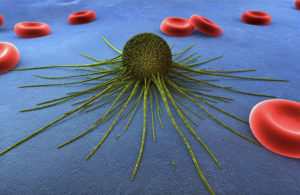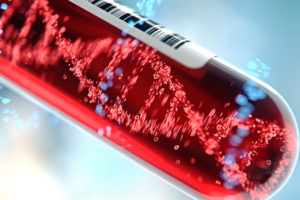Neuroendocrine Tumor Samples
Bay Biosciences provides high quality, clinical grade, FFPE tumor tissue blocks bio-specimens and matched cryogenically preserved sera (serum), plasma and peripheral blood mononuclear cells (PBMC) biofluid samples from patients diagnosed with neuroendocrine tumors.
The sera (serum), plasma and PBMC biofluid specimens are processed from neuroendocrine tumor patient’s peripheral whole-blood using customized collection and processing protocols. The neuroendocrine biopsy tumor tissue and matched biofluid samples are collected from unique patients diagnosed with neuroendocrine tumors and are provided to a valued pharmaceutical customer for research, diagnostics, discovery and drug development.
Detailed clinical data, patients history, symptoms, complete blood count (CBC), serology, MRI, biopsy tumor tissue, histopathology information, elevated biomarker levels, genetic and metabolic information associated with Follicular Lymphoma specimens is provided to a valued customer for research, development and drug discovery.
The neuroendocrine tumors sera (serum), plasma and peripheral blood mononuclear cells (PBMC) biofluid are processed from patients peripheral whole-blood using customized collection and processing protocols.

Neuroendocrine Tumors Overview
A neuroendocrine tumors (NET’s) begins in the specialized cells of the body’s neuroendocrine system. Neuroendocrine cells have traits of both hormone-producing endocrine cells and nerve cells. They are found throughout the body’s organs and help control many of the body’s functions. Neuroendocrine tumors are rare and can occur anywhere in the body. Most neuroendocrine tumors occur in the lungs, appendix, small intestine, rectum and pancreas. Hormones are chemical substances that are carried through the bloodstream to have a specific effect on the activity of other organs or cells in the body. All NETs are considered malignant tumors. Most NETs take years to develop and grow slowly. However, some NETs can be fast-growing.
Diagnosis and treatment of neuroendocrine tumors depend on the type of tumor, its location, whether it produces excess hormones, how aggressive it is and whether it has spread to other parts of the body.
Neuroendocrine tumors can begin in any part of the body, including the following:
- Gastrointestinal (GI) tract: Neuroendocrine tumors develop most commonly in the gastrointestinal (GI) tract, specifically in the small intestine, appendix and large intestine. The GI tract plays a central role in digesting foods and liquids and in processing waste. GI tract neuroendocrine tumors.
- Lung: The lung is the second most common location for neuroendocrine tumors. About thirty percent of neuroendocrine tumors develop in the bronchial system, which carries air to the lungs.
- Pancreas: Neuroendocrine tumors can develop in the pancreas, a pear-shaped gland located in the abdomen between the stomach and the spine. However these are less common compared with gastrointestinal (GI) tract neuroendocrine tumors and lung neuroendocrine tumors.
Neuroendocrine tumors can also begin in other organs. In around fifteen percent of the cases, a primary site cannot be found. Sometimes, neuroendocrine tumors may develop in or on the adrenal glands. These rare types of neuroendocrine tumors are called pheochromocytoma and paraganglioma. Other types of tumors that begin in hormone-producing cells are thyroid cancer, adrenal gland tumors and pituitary gland tumors.
Types of Neuroendocrine Tumors
- Adrenal Gland Cancer
- Carcinoid tumors
- Merkel cell carcinoma
- Pancreatic neuroendocrine tumors
- Paraganglioma
- Pheochromocytoma
Causes of Neuroendocrine Tumors
Exact causes of why patients develop neuroendocrine tumors are unknown. Neuroendocrine cancers develop in neuroendocrine cells that have traits similar to those of nerve cells and hormones-producing cells. Neuroendocrine cells are found throughout a persons body.
Neuroendocrine tumors begin when neuroendocrine cells develop changes or mutations in their DNA. The DNA inside a cell contains the instructions that tell the cell what to do. The changes tell the neuroendocrine cells to multiply rapidly and form a tumor. Some neuroendocrine tumors grow very slowly. Others are aggressive cancers that invade and destroy normal body tissue or spread and metastasize to other parts and organs of the body.
Signs and Symptoms of Neuroendocrine Tumors
In the beginning Neuroendocrine tumors don’t always cause any signs and symptoms. Usually the symptoms a patient might experience depend on the location of the tumor and whether it produces excess hormones.
Following are the common signs and symptoms of neuroendocrine tumors:
- Pain when the tumor is growing in the body
- Lump can be felt under the skin where the tumor is growing
- Usually feeling tired and fatigued
- Losing weight without any reason
Neuroendocrine tumors that produce excess hormones or functional tumors may cause the following signs and symptoms:
- Feeling thirsty
- Flushing or redness of the skin
- Dizziness
- Diarrhea
- Increased urinary frequency
- Rashes on the skin
- Tremors
Diagnosis of Neuroendocrine Tumors
Several diagnostic tests are performed to find and diagnose, neuroendocrine tumors. Also, tests are conducted to learn if cancer has spread to another part of the body from where it started, which is called metastasis. Imaging tests can show if the cancer has spread, these imaging tests show pictures of the inside of the body. For most types of tumors, a biopsy is the only sure way for the doctor to know if an area of the body has a tumor. In a biopsy, the doctor takes a small sample of tissue for testing in a laboratory. If a biopsy is not possible, the doctor may suggest the following tests that will help make a diagnosis:
- Blood/urine tests
- Molecular testing of the tumor
- Endoscopy
- Ultrasound
- X-ray
- Computed tomography (CT or CAT) scan
- Magnetic resonance imaging (MRI)
- Nuclear medicine imaging
- OctreoScan
- Positron emission tomography (PET) or PET-CT scan

Bay Biosciences is a global leader in providing researchers with high quality, clinical grade, fully characterized human tissue samples, bio-specimens and human bio-fluid collections from cancer (tumor) tissue, cancer serum, cancer plasma cancer PBMC and human tissue samples from most other therapeutic areas and diseases.
Bay Biosciences maintains and manages it’s own bio-repository, human tissue bank (biobank) consisting of thousands of diseased samples (specimens) and from normal healthy donors available in all formats and types. Our biobank procures and stores fully consented, deidentified and institutional review boards (IRB) approved human tissue samples and matched controls.
All our human human tissue collections, human specimens and human bio-fluids are provided with detailed samples associated patient’s clinical data. This critical patient’s clinical data includes information relating to their past and current disease, treatment history, lifestyle choices, biomarkers and genetic information. Patient’s data is extremely valuable for researchers and is used to help identify new effective treatments (drug discovery & development) in oncology, other therapeutic areas and diseases. This clinical information is critical to demonstrate their impact, monitor the safety of medicines, testing & diagnostics, and generate new knowledge about the causes of disease and illness.
Bay Biosciences banks wide variety of human tissue samples and biological samples including cryogenically preserved -80°C, fresh, fresh frozen tissue samples, tumor tissue samples, FFPE’s, tissue slides, with matching human bio-fluids, whole blood and blood derived products such as serum, plasma and PBMC’s.
Bay Biosciences is a global leader in collecting and providing human tissue samples according to the researchers specified requirements and customized, tailor made collection protocols. Please contact us anytime to discuss your special research projects and customized human tissue sample requirements.
Bay Biosciences provides human tissue samples (human specimens) from diseased and normal healthy donors; including peripheral whole-blood, amniotic fluid, bronchoalveolar lavage fluid (BAL), sputum, pleural effusion, cerebrospinal fluid (CSF), serum (sera), plasma, peripheral blood mononuclear cells (PBMC’s), saliva, Buffy coat, urine, stool samples, aqueous humor, vitreous humor, kidney stones, renal calculi, nephrolithiasis, urolithiasis and other bodily fluids from most diseases including cancer. We can also procure most human bio-specimens and can do special collections and requests of human samples that are difficult to find. All our human tissue samples are procured through IRB approved clinical protocols and procedures.
In addition to the standard processing protocols Bay Biosciences can also provide human plasma, serum, PBMC bio-fluid samples using custom processing protocols, you can buy donor specific sample collections in higher volumes and specified sample aliquoting from us. Bay Biosciences also provides human samples from normal healthy donors, volunteers, for controls and clinical research, contact us Now.
日本のお客様は、ベイバイオサイエンスジャパンBay Biosciences Japanまたはhttp://baybiosciences-jp.com/contact/までご連絡ください。


